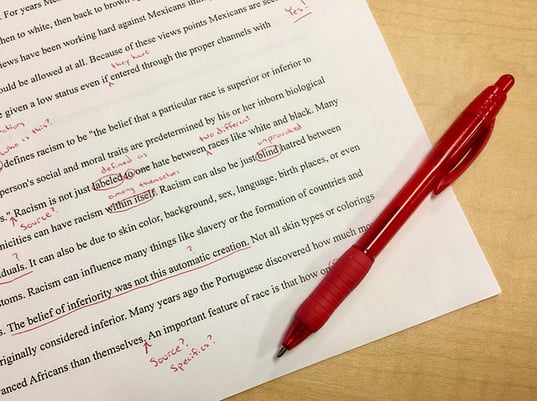Gre Analytical Writing Sample Essays Pdf
The California Institute of Technology—or Caltech, as it's more commonly known—is a highly exclusive college. If you want to join the Beavers, you'll need not just top grades and standardized test scores, but strong writing supplements to support them as well. Caltech accepts around 6% of students who apply, making it an extremely competitive school. The more you know about the Caltech essay prompts before you start, the better prepared you are to answer them. Read on to learn about 2021's essay prompts, as well as some tips and tricks for maximizing their potential to impress! Feature Image: Canon.vs.nikon/Wikimedia Commons As a result of the novel coronavirus pandemic, many colleges have made the decision to at least temporarily stop requiring SAT and ACT scores. In June 2020, California Institute of Technology announced that they will stop considering SAT and ACT scores of applicants for the next two admission cycles (those applying in fall 2020, 2021, and 2022). This means that, not only are SAT and ACT scores not required, but, even if you submit them, they won't be reviewed and they won't be considered as part of your application. (This is what we refer to as a "test blind" policy.) Additionally, international students can now meet Caltech's English proficiency requirement by submitting either TOEFL or Duolingo scores. Because of SAT and ACT cancellations, as well as the difficulty some students are having preparing or paying for the tests, Caltech made the decision to temporarily stop requiring standardized test scores to make admissions as fair and equitable as possible. Because test scores aren't being considered, there will be an increased emphasis on classes students took and the grades they received in them. Caltech accepts both the Coalition and Common Application, so you can use whichever application suits you better. In addition to the required Coalition or Common Application essays, Caltech also requires three short essays. One essay asks you to describe an experience in which you encountered failure, in 100 to 250 words total. The other two essays cover what creative and fun interests you have and how you have or plan to collaborate with your peers. These two essays should also be between 100 and 250 words. Altogether, you'll be writing between 800 and 1400 words. These essays are fairly short, so you'll want to spend a good amount of time honing your argument to its most efficient. Start early so you have plenty of time to plan, refine, revise, and proof before you submit! Do a little preparation and you can look this happy when writing your Caltech essays, too! The Caltech essay prompts are fairly standard, though each one is tailored to the college's specifications. You'll see the usual "Overcoming Obstacles" and "Defining Your Fit" essay questions, but always keep in mind that you're applying to Caltech specifically, and your essays should reflect that. Tell us about a time or experience in which you encountered failure. (Your response should range between 100-250 words.) The first essay asks you to describe a time when you encountered failure. It's safe to assume that the prompt is referring specifically to a time when you failed at something. This means that you'll want to think of an example of a time in your life when you just weren't successful at something and write about that experience. Caltech wants you to use this space to demonstrate that you can learn and grow from your failures. The tone of your essay shouldn't be defensive, apologetic, or embarrassed. Failures often give people the chance to learn from what went wrong and then try, try again. Your essay needs to focus on the lessons you've learned from a failure you encountered in your life, and how you'll bring your knowledge to the Caltech community. Here's an example. Maybe you were attempting to organize a science fair at your high school, but you found that your fellow students just weren't interested, so the science fair didn't happen. You should reflect on why you think there was no interest in the science fair, then explain the actions you took to try to change things for students at your school in the future. In other words, you're telling Caltech a short story about yourself with this experience, demonstrating how you respond to failure. Specificity and brevity are your best friends in this section. It's important not to get bogged down in rehashing every little detail of what went wrong. Instead, your essay should emphasize what you learned and what you did to bounce back from the failure you encountered. As a STEM-focused college, Caltech wants to see students who are creative, strategic, and resilient. If you responded to your failure by trying again with a new approach, for instance, write about that. However you chose to handle your failure, it's important that you do your best to focus on how you became a better person--the kind of person Caltech wants!--through that experience. Tell us about a life situation, media story, or topic – beyond or outside of a classroom or formal assignment – that has captivated you, inspired your curiosity, and led you to delve more deeply into learning about a subject on your own. (Your response should range between 100-250 words.) This prompt is asking you to discuss something you're passionate about. Your interests and activities outside of school and work can reveal a lot about the kind of person you are. As such, this prompt is a great opportunity to show how you exhibit the characteristics of the perfect Caltech candidate in your life experiences that don't show up in your test scores and GPA. Hopefully, thinking of a topic for this essay will be easy for you. You should write about a situation, story, or topic that gets you so engrossed and excited that it's tough to tear yourself away from learning about it! Whether that's reading up on the psychology of conspiracy theories or bird watching with your little brother, the most important thing is that you choose something that you're deeply interested in. When you do that, admissions counselors will be able to feel your passion too! Even though you probably could write pages and pages about the topic you choose, it's important to keep things clear and concise here. Remember: you only have 250 words to work with! To keep your essay focused, tell the story of what you do when you "delve more deeply" into the subject you've chosen to write about. You can describe your learning process, even if it's quirky or unconventional. This is your chance to show Caltech how you choose to expand your mind when left to your own devices. And that's the most important thing to emphasize in your essay. Caltech is looking for students who don't stop learning when the semester ends. The people who make a difference in the world are passionate, lifelong learners. This essay is your chance to show off your niche interests and prove to Caltech that you're a lifelong learner too. This guy would fit right in at Caltech. Tell us about how you have collaborated with and worked together within a small group of your peers on some task or endeavor in the past, or about how you imagine you will work with your Caltech peers in the future. (Your response should range between 100-250 words.) This question is a variation of the very common "college fit" question. Essentially, the admissions office wants to hear about how your past experiences and goals for the future have enabled you to make meaningful contributions at Caltech. How do you work with others to get things done? How will you collaborate with others to accomplish things in the future? The purpose of this question is to learn more about how you function when working with groups of people. If you're in the running for Caltech, you're already a student with a strong academic record—and so is everybody else at your level. This question wants to know whether you can apply your gifts and skills to achieve collective goals with other equally talented individuals. Will you be the kind of lab partner, research assistant, or teammate that Caltech wants to have around? While it's important that your essay focus on collaborating with others, the context for that collaboration is up to you. It could be something academic, extracurricular, or community-oriented. Whatever you choose to write about, you need to focus on explaining the benefits, challenges, and outcomes of your collaboration. The best way to convey this info is by telling a story. Rather than drafting out a list of all the things your group of peers did and accomplished, use vivid descriptions of what the team atmosphere felt like, the talents and contributions of the other people involved, and your feelings about the experience. Your essay doesn't necessarily need to focus on some big achievement. Rather, it needs to show that you understand the importance of collaboration for solving problems, achieving goals, and creating a better future for the world around you. There are a few things to avoid with this prompt. You definitely need to highlight the contributions you made to your group's effort, but don't go overboard bragging about how the team couldn't have done it without your incredible talent. Attending college is fitting into a community, and Caltech wants to know that you'll be a willing participant and collaborator. If you come off as arrogant, you may stick out for the wrong reasons. And, remember: always come back to specificity and stating why. It's better to be clear and concise than wordy and opaque! As long as your essay provides the core details of an important collaboration from your past or one you hope to engage in at Caltech, you'll be on the right track. It probably wasn't one of these kids who wrote these successful Caltech essays. All this information is great, but it can still be tricky to understand exactly what Caltech wants to know until you've seen it demonstrated. Check out this accepted essay—and some tips from someone who took a serious risk—to learn more about what Caltech hopes to see in your essay! Even though the example essays below respond to old essay prompts, there's still a lot you can learn from them about how to write successful Caltech essays. I cross over the bridge into Minnesota. Out of my three sports, cross country is definitely my worst — but I continue to be hooked on it. Unlike swimming and track, my motivation to run is heavily intrinsic. I live for the long runs I take on by myself. While they rarely happen during our season, we were assigned a long run to complete over our first weekend of cross country. In reality, I was supposed to go six miles, but felt eight gave me more time to explore the home I had just returned to. My mind begins to wander as I once again find my rhythm. My train of thought while running is similar to the way one thinks in the minutes before sleep — except one has more control over how these thoughts progress and what tangents they move off of. While special relativity would be the "proper" thing to think about, especially at MITES, I revive the violin repertoire I had turned away from for so long and begin playing it in my head. I'm now at the edge of town in between the cornfields. The streaming floodlights on the open road give me a sense of lonely curiosity, reminiscent of the opening lines of Wieniawski's first violin concerto. I come up with adaptations of the melody in my head, experimenting with an atonality similar to Stravinsky's. Martin Altenburg's essay is well-structured, using the narrative of a morning run to demonstrate all the things that run through his head, and, more importantly, all the unique traits that make him who he is. From just these two paragraphs, we know he's a runner, that he's driven, that he strives for more than he thinks he's capable of, and that he knows music and composition. Because the essay is in a narrative format, we're able to follow this line of thinking and have it all wrapped up neatly at the end. We're drawn in by energetic and purposeful writing that also delivers us all the information we need. Throughout the essay, Altenburg discusses his interests and his growth. His strategic use of locations in his hometown allows readers to understand where he comes from both literally and figuratively, especially the part about his beliefs and how the community he's grown up in have impacted them. All this is valuable information to an admissions office, who wants to see how you see yourself and why. One thing to note about this essay is that it doesn't include any reference to Caltech. In fact, Altenburg used the same essay to apply to—and get into—eight different Ivy Leagues as well as some other schools. The essay was likely written as part of the Common or Coalition Application rather than as part of Altenburg's Caltech supplement, hence the lack of specificity. Your essays for the Caltech supplement should contain more specificity than this, as these essays are unique to Caltech and want to know exactly what draws you to that school above others. "How do you believe Caltech will best fuel your intellectual curiosity and help you meet your goals?" If I had a few weeks, I might have done enough research to namedrop a few professors, rave about the strength of their computer science programs, and come up with a compelling story about all my professional goals. But I didn't have those few weeks, so I told them the unembellished, wholehearted truth: I said I have no idea what I want to do in life. All I knew was that I liked making calculator games and explosions and wanted to participate in the bread-throwing, water-dumping congregations otherwise known as Caltech house dinners. As it turns out, being yourself actually works. Shocker, I know. Colleges really do want to like you for you. Michelle Fan doesn't post her Caltech essay directly, but she does talk about her process and what she discovered between her highly planned essays and the ones she wrote the day they were due. Fan points out that her last-minute essays, the ones that she wrote from her heart rather than from her head, are the ones that got accepted. Though I definitely don't advocate for waiting until the same day that your essay is due to start writing it, it's a good message to keep in mind—when you're faced with an imminent deadline and you just need to get something out, your writing is probably more genuine than if you've been editing and revising it for ages. But the big takeaway here should not be to wait until the last second to write your essay (please, don't do that!). The real lesson is that you should write in a way that is true to yourself, not a way that you think will impress admissions offices. You should be authentic and genuine, letting your personality and interests tell Caltech why you're a good fit. If your essay looks like this, that's a good thing! Like all college essays, there are some general things to keep in mind when working on your Caltech writing supplement. The earlier you get started, the better—take a little time to make sure that your essay is as polished as possible! Brainstorming before you start writing will help you pick a topic that's both meaningful and impressive. Jotting down a list of ideas for each topic, no matter how silly they might feel at first impression, gives you options. Spend a little time away from your options so that you can pick the one that you feel most strongly about with less bias! Feedback is an important tool as a writer. Getting someone else to look at your work—preferably someone who will be honest about its shortcomings—will help you find logical holes, weird phrasing, and other errors that may creep into your work. When you feel like your essays are as polished as you can make them is a good time to hand them off to someone else. Remember, you don't have to make every change they suggest exactly as they suggest it, but if your reader is confused about something, see what you can do to make it clearer! Take that feedback you got from your reader and turn it into gold. Again, don't feel like their suggestions are always the right move, but do consider what's causing their confusion or dislike for parts of your essays. Fix them in your own voice, and re-read your essay, especially out loud, to catch any additional errors. The more time you can spend revising, the better! Always remember that you're not just trying to impress Caltech with a bunch of statistics—you're trying to impress them as you. That means always staying true to yourself and striving for authenticity. Give Caltech an essay that showcases what it means to be you, not an essay that gives them what you think that they want to hear. Need an even more in-depth guide to how to write a college essay? Those tips will help you write a stellar essay from start to finish! A strong essay is just one part of a successful Caltech application. Also look into Caltech's SAT scores and GPA requirements so you can draft an effective academic plan! Before you send in your Caltech application, it's a smart idea to figure out how much money it's going to cost you to attend. How do Caltech's financial aid offerings measure up to tuition costs? Want to write the perfect college application essay? Get professional help from PrepScholar. Your dedicated PrepScholar Admissions counselor will craft your perfect college essay, from the ground up. We'll learn your background and interests, brainstorm essay topics, and walk you through the essay drafting process, step-by-step. At the end, you'll have a unique essay that you'll proudly submit to your top choice colleges. Don't leave your college application to chance. Find out more about PrepScholar Admissions now: 
BREAKING: Caltech Application Changes Due to COVID-19
What Do I Need to Know About the Caltech Essays?

What Are the Caltech Essay Prompts?
Prompt #1
Prompt #2

Prompt #3

Caltech Essays That Worked
Martin Alternburg's Essay
Michelle Fan's Essay Reflection

4 Key Tips for Writing a Caltech Essay
#1: Plan
#2: Get People to Read Your Essays for You
#3: Edit and Revise
#4: Be Authentic
What's Next?



About the Author
Melissa Brinks graduated from the University of Washington in 2014 with a Bachelor's in English with a creative writing emphasis. She has spent several years tutoring K-12 students in many subjects, including in SAT prep, to help them prepare for their college education.
Gre Analytical Writing Sample Essays Pdf
Source: https://blog.prepscholar.com/caltech-essays-supplement
Posted by: fernandezving1979.blogspot.com

0 Response to "Gre Analytical Writing Sample Essays Pdf"
Post a Comment